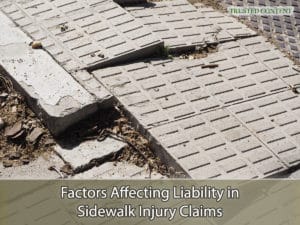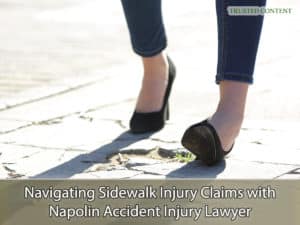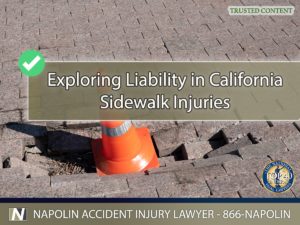Exploring Liability in California Sidewalk Injuries
Sidewalks are intended to provide pedestrians with a safe path, yet injuries frequently occur due to hazardous conditions. In California, understanding the legal framework surrounding sidewalk maintenance and liability is crucial for injury victims seeking compensation. Every year, countless individuals suffer slip-and-fall injuries or collisions with other sidewalk users. When these accidents occur, it’s essential to identify the responsible party and understand the laws governing liability. Napolin Accident Injury Lawyer is committed to helping injury victims navigate this complex area of law by providing comprehensive legal support.
California Law and Sidewalk Maintenance
California Streets and Highways Code 5610 places the responsibility for maintaining sidewalks adjacent to private property on the property owners. Property owners are expected to keep sidewalks in a condition that does not endanger pedestrians. They are also responsible for preventing conditions that interfere with the public’s safe use of the sidewalk. While cities can charge landowners for the cost of maintaining these sidewalks, it’s not a mandatory requirement. Local municipalities typically own sidewalks but often shift the burden of maintenance to adjacent property owners.
Property Owner Responsibilities
Property owners must ensure the sidewalks adjacent to their properties are safe for public use. This includes repairing cracks, uneven surfaces, and any other defects that pose a risk to pedestrians. Failure to do so could result in liability if a pedestrian is injured due to hazardous conditions. Additionally, property owners should regularly inspect their sidewalks for potential hazards like tree roots, ice, or debris.
Municipal Involvement
Municipalities typically own sidewalks and are responsible for their general maintenance. However, many local ordinances shift this responsibility to adjacent property owners. Cities may impose fines on property owners who neglect sidewalk maintenance, though enforcement varies by jurisdiction. Municipalities also have the authority to repair sidewalks and bill property owners for the costs.

Factors Affecting Liability in Sidewalk Injury Claims
Factors Affecting Liability in Sidewalk Injury Claims
Several factors impact liability determination in sidewalk injury claims:
Location of the Sidewalk
Liability differs based on whether the sidewalk is on public or private property. Public sidewalks are typically owned by municipalities, while private sidewalks are maintained by property owners. For instance, sidewalks in gated communities or apartment complexes may fall under private ownership, affecting who is responsible for injuries.
Responsible Party for Sidewalk Upkeep
Depending on local ordinances, responsibility could fall on the city government or property owners. In some cases, municipalities may shift maintenance responsibilities to adjacent property owners through local ordinances. Understanding these ordinances is crucial in determining liability.
Condition of the Sidewalk
Common hazardous conditions include cracks, potholes, and irregular surfaces caused by tree roots or poor maintenance. Defects like uneven pavement can lead to serious injuries, especially for elderly pedestrians. Property owners should address such issues promptly to avoid potential liability.
Circumstances of the Accident
Liability varies between slip-and-fall incidents, collisions with other users, or accidents due to obstructions. For instance, a collision between a bicyclist and a pedestrian may involve different liability considerations compared to a trip-and-fall incident. Understanding the circumstances of the accident is essential for determining fault.
Behavior of the Injured Party
Comparative negligence laws in California may reduce compensation based on the injured party’s behavior. If the injured party was distracted or behaving unsafely at the time of the accident, their compensation might be reduced proportionally. This underscores the importance of accurate evidence gathering.
Common Causes of Sidewalk Injuries
Sidewalk injuries can arise from various hazardous conditions. The most common causes include:
Slip-and-Fall or Trip-and-Fall Accidents
These accidents often result from uneven pavement, cracks, potholes, and slippery surfaces. Pedestrians may also trip over tree roots that have lifted the pavement or slip on icy or wet sidewalks. Such incidents can lead to severe injuries like broken bones, concussions, and spinal cord injuries.
Collisions
Pedestrians sometimes collide with bicyclists or runners on the sidewalk. While California law prohibits bicycles on sidewalks in certain areas, enforcement varies by city. Pedestrians may also be struck by scooters, skateboards, or other fast-moving objects. These collisions can result in severe injuries and raise questions of liability.
Obstructions and Poor Design
Obstructions like trash, construction equipment, and parked cars can lead to injuries. Poorly designed sidewalks with steep slopes, inadequate lighting, or narrow pathways also pose a significant risk. Property owners must ensure that their sidewalks are free from such hazards to prevent accidents.
Environmental Factors
Poor lighting, ice, and slippery conditions are frequent causes of accidents. Pedestrians are particularly vulnerable during the winter months when icy conditions prevail. Additionally, inadequate street lighting makes it difficult for pedestrians to identify and avoid potential hazards.
Premises Liability and Government Liability
In California, sidewalk injuries fall under premises liability laws. Property owners are required to maintain safe conditions for pedestrians. The concept of premises liability holds that a property owner is liable for injuries if they knew or should have known about a dangerous condition and failed to fix it. Government Code Section 835 states that a public entity is liable for dangerous conditions on its property if:
- The condition posed a reasonably foreseeable risk of injury.
- The public entity had actual or constructive notice of the dangerous condition.
- The condition was created due to the negligence of an employee or lack of proper maintenance.
Public entities, such as cities or counties, may be held liable if they failed to repair known dangerous conditions. However, determining government liability requires proving that the entity had notice of the hazard. This often involves showing that the dangerous condition existed long enough that the government should have discovered it.
Filing a Claim Against the Government
Under the California Tort Claims Act, citizens can file claims against government entities responsible for dangerous conditions. However, the process involves specific conditions:
Notice of Claim
A notice of claim must be filed with the government within a limited timeframe, or the right to compensation may be forfeited. This period is typically six months from the date of the injury. Failure to file within this timeframe may result in losing the right to sue.
Limits on Damages
There may be limits on the compensation amount based on local laws and accident type. Government entities often impose caps on the amount of damages that can be awarded in personal injury claims. These limits vary based on the type of injury and the entity’s policies.
Need for Legal Assistance
Given the complexities of proving negligence and holding the government accountable, injury victims should consult an experienced attorney. Navigating government claims requires a deep understanding of local ordinances, the Tort Claims Act, and evidence gathering. Legal representation ensures that victims can secure fair compensation.

Navigating Sidewalk Injury Claims with Napolin Accident Injury Lawyer
Navigating Sidewalk Injury Claims with Napolin Accident Injury Lawyer
Napolin Accident Injury Lawyer has extensive experience in handling sidewalk injury claims across California. Our firm understands the unique challenges involved in proving negligence and securing fair compensation. We work closely with clients to investigate the accident, identify responsible parties, and build a strong case.
Our legal team is well-versed in navigating local ordinances and premises liability laws. We understand the tactics used by insurance companies and government entities to minimize payouts. With our comprehensive approach, we help clients maximize their compensation and hold negligent parties accountable.
We believe in personalized representation tailored to each client’s needs. From the initial consultation to the final settlement, we provide unwavering support and guidance. Our extensive litigation experience ensures that clients are fully prepared for any challenges that may arise.

Exploring Liability in California Sidewalk Injuries
Exploring Liability in California Sidewalk Injuries
Understanding liability in sidewalk injury cases is essential for victims seeking compensation. At Napolin Accident Injury Lawyer, we provide comprehensive legal support to help victims receive the justice they deserve. Our team is committed to holding negligent property owners and government entities accountable.
Those injured near the Inland Empire in southern California can call (866)-NAPOLIN to secure a free consultation and take the first step towards their recovery. Our extensive litigation experience ensures that clients across southern California receive the representation they need to hold negligent parties accountable. Rest assured that there are no fees unless we win your case. Contact us today for a risk-free consultation.
- A Guide on Red Light Auto Accidents in California - August 14, 2024
- Self-Representing in a California Personal Injury Claim - August 13, 2024
- Common Sources of Distraction for Drivers in California - August 13, 2024
